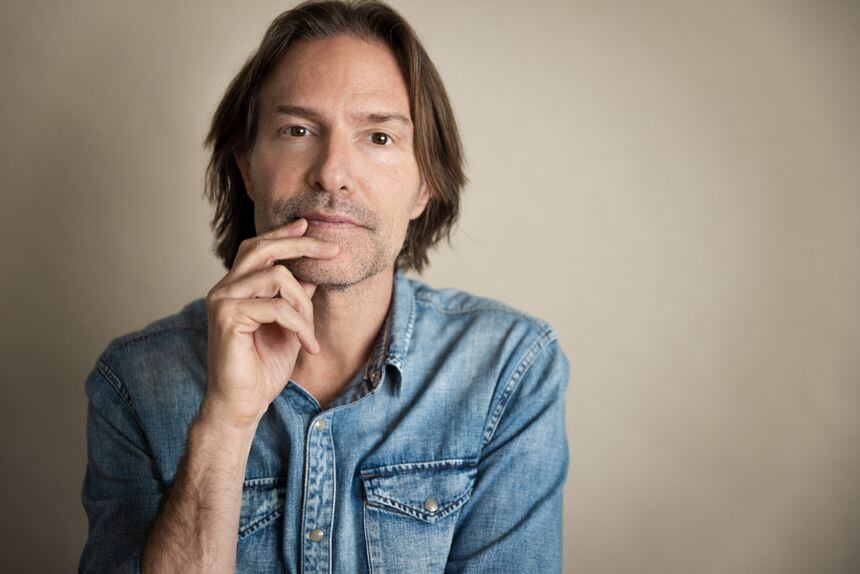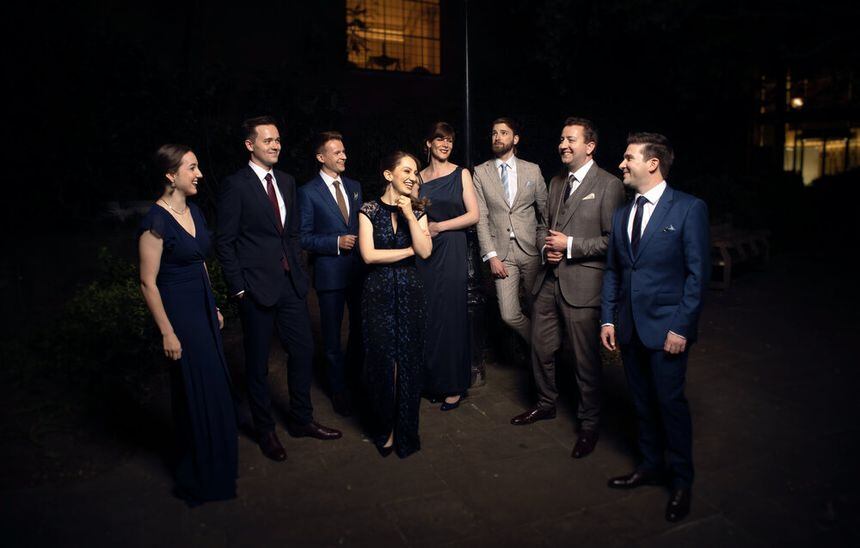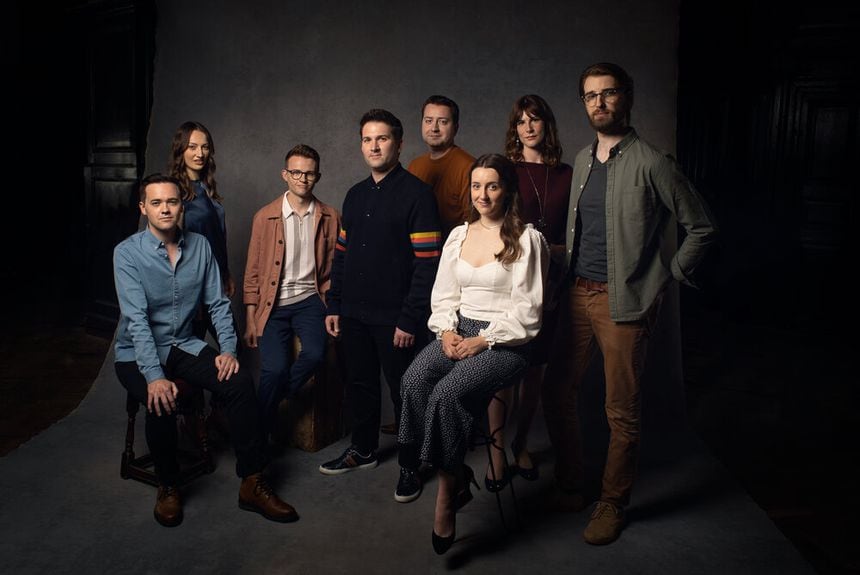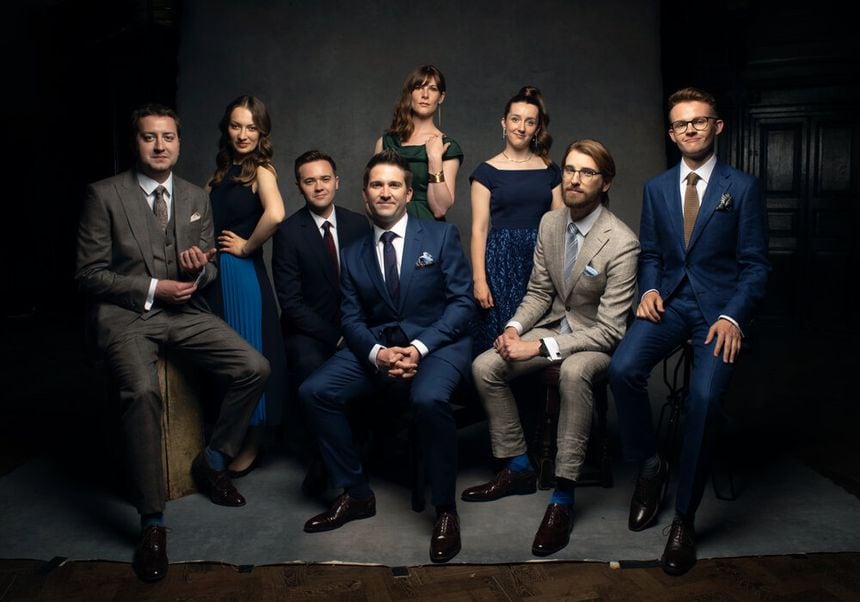Has the idea of breaking down the boundaries between repertoires and eras become a must for you?
Barnaby Smith: That’s a very good question, I think it’s nice for a listener to be taken on a journey and so that’s always our primary focus and we try to think about discs and albums a little bit differently to concert programs, but yes as a group we do specialize in multi-genre singing and so naturally I think that presents itself also in our disc repertoire.
Andrea Haines: It’s really nice if somebody comes to an album or to a concert loving a particular type of music, or coming for a particular thing and then discovering something else on the way as well.
B.S: That also happens for me I should say, often with our albums we we work with A&R and they introduce us to repertoire that I before wasn’t necessarily aware of and so it’s a good process for the group to go on...
A.H: ... on a voyage of discovery!
I guess it means a certain agility, I mean to to move from a repertoire to another it’s, technically, like sports in a way.
B.S: Well it’s funny you say sports because the way we tend to describe it is that we’re multi-discipline athletes, so you know you think of the heptathlon, for example, as opposed to people who just trained to Sprint, so the opera singers might be the sprinters, they go out there and do all their bel canto repertoire which we’re not necessarily suited to, or, as individuals, we’d have to do a lot more training in that style to sing in that way, but instead we try and make sure that we’re versatile across multi-events which is not necessarily just from the presentation of the singing but it’s also how we are as musicians as well, we need people in the group who are curious to learn and work in different styles
Does this mean that you each have a specialisation?
A.H: Definitely yeah we all we all have some different skillsets, different interests, if you asked everybody in the group what they listen to in their spare time it would be a completely different and varied set of answers, from Bach to Chris Thiele or R&B, so it’s a really big range of interests within the group.
B.S: And actually if you’d come on tour with us, we tend to tour with two vehicles, so depending on who’s in which vehicle will depend, off and on, who’s running the playlists. But the playlist are really interesting and I learn, you know, if I spend a lot of time driving, and I if I’m sitting next to Andrea for example I get music that I would never listen to Myself, and it’s great!
What do you have in your playlists?
A.H: Oh, that’s a good question, okay I’m eclectic so, everything for me from Kendrick Lamar to, as I said Chris Thiele, and some folk stuff. I’m really into that indie side of music.
B.S: Whereas I listen much more down the classical end, so I’m Bach, Handel, Renaissance polyphony, very very different, I do love Michael Jackson, it’s my absolute favourite, and on every tour we go on we have to hear Brooks Violin Concerto in my car and Rachmaninoff’s second piano concerto and if we get that I’m happy.




How do you build your programs? How does it start? Is it an idea, a concept, a piece of music and you build after that?
B.S: Yeah it can be, I mean often it’s external influence so we’re here at La Folle Journée where they have a new idea every year, so sometimes for us it’s a festival like this that can spur a new concept, so we have to put together 45 minutes to come here, which often brings in new repertoire new ideas and we might then choose to spin that out into a new program. Sometimes it’s working with our record label Decca on new ideas with them. It can be a whole set of different influences and of course, sometimes we sit down and say okay well this is a concept that we want to explore but yeah, I think working in a group like this with the same eight people all the time it’s a fantastic thing to be able to do because you can develop as a team and as a unit which is so helpful for on-stage performance, but sometimes it can become a little bit insular and so it’s helpful to have external influence just to pop the bubble a little bit.
Is there a difference in your approach between the stage and recording in the studio?
A.H: Absolutely! I mean there’s obviously a slightly different take between them, because when we’re recording, very often you know microphones are quite close so they’re recording our voices from quite a short distance and obviously that’s different when we have an audience and a room to fill in that respect, but we do try to certainly create the same kind of sounds the same kind of experience, in a lot of (our performances) the sounds that we make but there’s a different sort of technical challenge in it for us.
B.S: Yeah and there’s things like when you’re presenting stage you’re presenting visually, so having things like a bit of humour in a concert is a great thing, you know people will leave in a much better mood if they’ve laughed a little bit as well as experience some great music, so experiences of course they’re really different things now as Andrea says, people always ask us how do we make the sounds on CD? I think it’s quite simple. We mic close and sing quietly, so I reckon We Sing close to, most of the time, close to half the volume or less in a recording environment compared to when we’re live on stage, and that’s really the secret and we hope that when people listen they feel like it’s a very intimate sound because that’s what we’re trying to achieve.
Recordings is like a sound quest in a way, you’re looking for something. When you’re live you don’t know if you’re in a good mood, too hot or too cold, how the audience is going to be, if there’s going be a noise somewhere...
B.S: Well every day also. You mentioned the audience, the audience is different every day, but so is the venue and of course when you’re an acoustic music group the venue has such an important part to play in how you’re going to walk in and sing from a singer’s perspective, so yeah you’re absolutely right we sit there don’t we, we go often when we record we will sing the piece two or three times and then we go and sit and listen to it and have an artistic discussion, how does it sound how’s it balanced, are we moving in the direction that we want to move in artistically speaking and so yeah, each piece is its own little Jewel and we spend a long time chipping away at it yeah we do yeah it’s a little bit like that. It’s a bit like creating a sculpture.
Tell us a bit about the new album Home with Eric Whitacre. Did you prepare it with him?
A.H: The album is based around one of Eric’s recent works, The Sacred Veil, which sort of forms the backbone of the album, but then we’ve been lucky enough to record some of his other works around that, from his very first piece “Go, Lovely Rose”, to a new a piece that he wrote just last year. So we’ve kind of explored the complete range of his musical journey with him. But within that is this really important piece, The Sacred Veil, which describes another journey actually, Eric’s sort of telling the story of his friend and their experience with losing his wife to ovarian cancer, and it goes through everything: love, loss, grief, and hopefully, maybe a sense of hope at the end of that as well, but it’s been an incredible experience for us to work with Eric and really dive into that story and the story of his composing life as well, and to get to work with him and really sort of understand where he’s coming from was really very precious.
B.H: Having the composer there in the room is very helpful, but Eric also brings a slightly different energy I think to the working environment than we naturally have as a group of eight. We’re very interested in technique and the delivery in the sense of what we’re doing and Eric’s a much more free spirit. The thing I thought he got just right was he came in and conducted us, and it’s very easy for conductors, especially when they’re the composers, to be really quite controlling of what’s going on.... the thing I loved about working with him is he showed us a really clear direction all the time, but then he let us work it out for ourselves a little bit, instead of just telling us. He was inviting us to go with him on a journey, and I think that there were times in the sessions where there are some things in the piece which are really difficult, emotionally definitely, but also technically to achieve, especially with just eight people, and there were times when he just said you know what why don’t you guys just take a few minutes to work this out and he just lay down on the floor, and he loved to feel the vibrations of the group through the floor so he just came and like lay down in the middle of our horseshoe and just let us spend 10 minutes playing, so it was a really nice thing.
Is it easy to work democratically within the group, or is there some tension sometimes? A coup d’état…
B.S: Well there kind of should be a little bit because it’s just a bit boring if you develop a sort of way of doing it and everyone conforms...
A.H: It shows that people care!
B.S: Yeah it does. I mean democracy takes time, so the way we tend to work it is; I’m the assistant director so I will just run something and then if somebody wants to say something they can, or sometimes, you know we’ve talked about different people having different expertise, if someone else is particularly good in a certain area or has expertise then they might run it. So it’s a functional democracy.
A.H: Definitely, sort of opening possibilities and creating a forum in which we can discuss that and of course, you know, it’s music, so in many ways there’s no wrong or right, it’s all eight different opinions of the ways it could work, and Barnaby’s job as artistic director is really to find a path through those opinions into something that’s cohesive overall in a piece of music because otherwise it can get a little bit frenetic, we’re having lots of different ideas, so the idea is to have everybody feel like they can say their part, and then find a good pathway through.
Basically, the idea is to find a voice that is unique to Voces8, and not just the sum of your eight voices?
A.H: I think it’s probably one of the unique things about Voces8 actually is that balance. Getting the balance between Voces8 as a unit. People come to us and, like Jacob Collier for example, when he worked with us he was excited to work with us because he wanted Voces8 “the instrument.”
B.S: Yeah and to be a musician you have to be someone who’s very benevolent, you need to be willing to give of yourself to the ensemble, you know probably when we stand on stage, for less than 10 minutes of a concert we’re singing as ourselves and 90 percent of the time you’re making changes to how you produce sound, or the sound that you’re producing as an individual to match the group, but then what’s better than voices in harmony?
Whitacre: The Sacred Veil - XII. Child of Wonder
Voces8VEVOTell us a bit about your foundation, the Voces8 foundation, where did that idea come from?
B.S: Well when we began Voces8, that would be 17-18 years ago, now my brother Paul, who is now our CEO and founded the group with me, at the time was working with large symphony orchestras doing their outreach work. He realised the importance of that work, and so we were very committed right from the beginning, as well as creating a performance ensemble, to also engaging in our community outreach work like this. We now have a foundation in the US, and also in France, and we work all around the world. I think for us the two most important things are that there is music in the community, and also in the curriculum because it’s a vitally important part of young people’s development. It’s important that they have opportunities to engage, not just with music, but with the creative arts.
As a concert goer, how did you find the pandemic and the lockdowns?
A.H: It actually ended up being quite an interesting time because it allowed us to develop a completely different side to the job really, and that was developing the digital side of what we do, so we actually started up our own online destival concert series called “Live from London” at the beginning of the pandemic and around that. It’s still going now, we run two or three a year, and that was really sort of the lifeline for us. We created this series we obviously performed in it ourselves but we also got lots of our industry colleagues involved in that as well.
B.S: We managed to provide work for 500 musicians and big technical teams and all that kind of stuff, and we’re proud of the achievement. We also created a digital academy, we tried to take our music to people in a way that they could still take part in singing themselves because a lot of the feedback we had was that people just missed their daily interactions, When I look back on the pandemic, certainly the significant part of it is how it affected us professionally, and actually we’re stronger as a group, as a business and as a brand coming out of it than we were going into it, and that’s something that I think we can, you know, we can be proud of.





